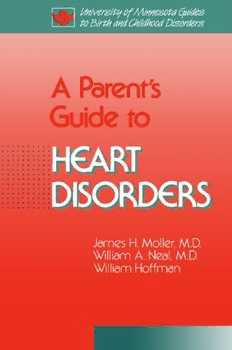
Parent's Guide to Heart Disorders (University of Minnesota Guides to Birth and Childhood Disorders) PDF
169 Pages·1988·6.521 MB·English
Most books are stored in the elastic cloud where traffic is expensive. For this reason, we have a limit on daily download.
Preview Parent's Guide to Heart Disorders (University of Minnesota Guides to Birth and Childhood Disorders)
Description:
A Parent's Guide to Heart Disorders was first published in 1988. The outlook for children with heart disease is much brighter today than it was just a few decades ago; medical and surgical advances now make successful treatment possible. Yet, as the field of pediatric cardiology becomes increasingly technical, parents are in greater need of clear, readable information on the subject. The authors of this book know that informed parents can best allay a child's fears, prepare the child for treatment, and assist in recovery. In A Parent's Guide to Heart Disorders, they describe the structure and function of the normal heart and then show how the pediatric cardiologist evaluates and tests the young patient. Diagnosis may include several noninvasive procedures -- electrocardiogram, chest x-ray, and echocardiogram -- and a key invasive procedure, cardiac catheterization, now the most accurate and thorough means of assessing the heart's condition. These tests are all carefully described, with a full and reassuring chapter devoted to catheterization, a process often especially worrisome to parents. The book's central chapters deal with the nature and treatment of the most common congenital and acquired heart diseases; the evaluation and care of cardiac arrhythmias, or irregularities of heartbeat; and cardiac surgery -- its development and the role its plays in treatment today. The congenital disorders surveyed are ventricular septal defect, aortic stenosis, tetralogy of Fallot, and transposition of the great vessels. (Other, less common congenital diseases are described in an appendix.) The acquired, or postnatal, disorders covered are cardiomyopathy (a broad range of conditions that affect the heart muscle), rheumatic fever, bacterial endocarditis, Kawasaki disease, mitral valve prolapse, and pericarditis. The last chapters offer sensible advice on coping with everyday life -- for both parents and children -- and on con
See more
The list of books you might like
Most books are stored in the elastic cloud where traffic is expensive. For this reason, we have a limit on daily download.
